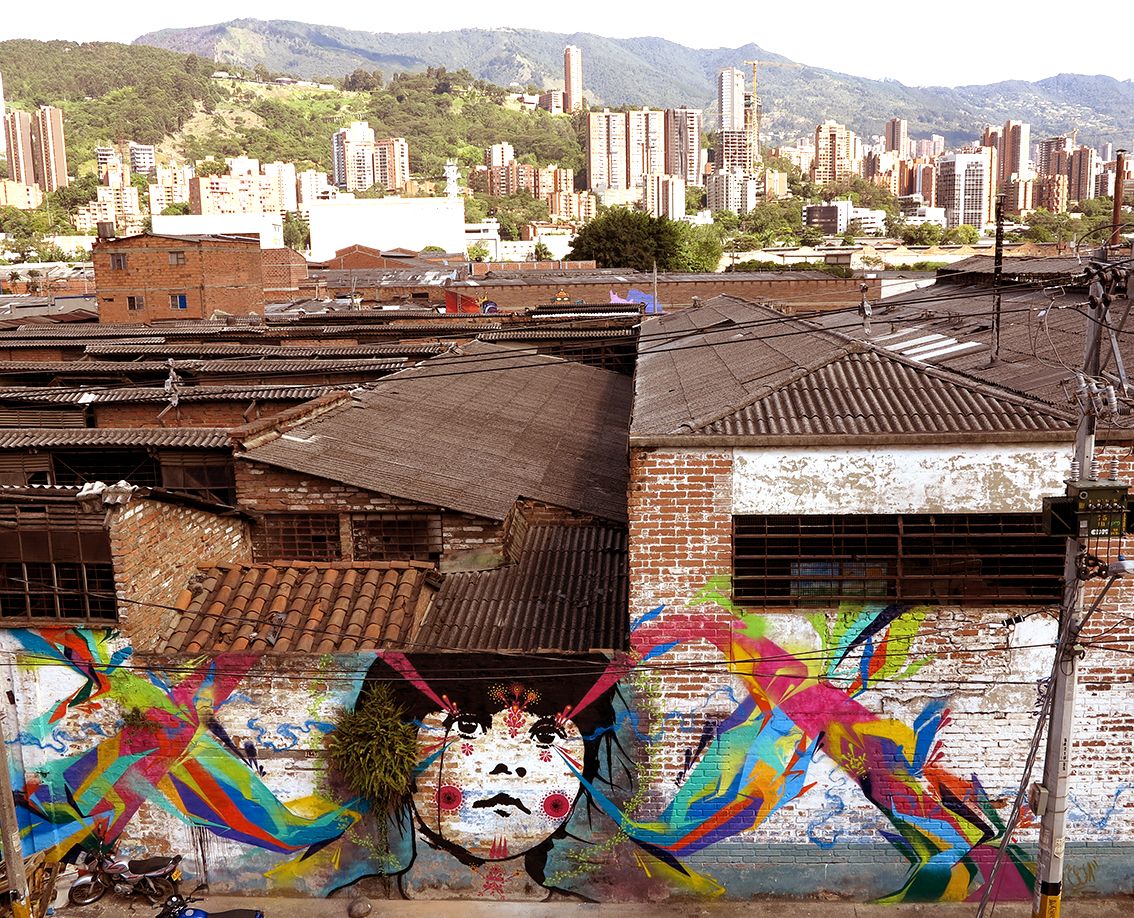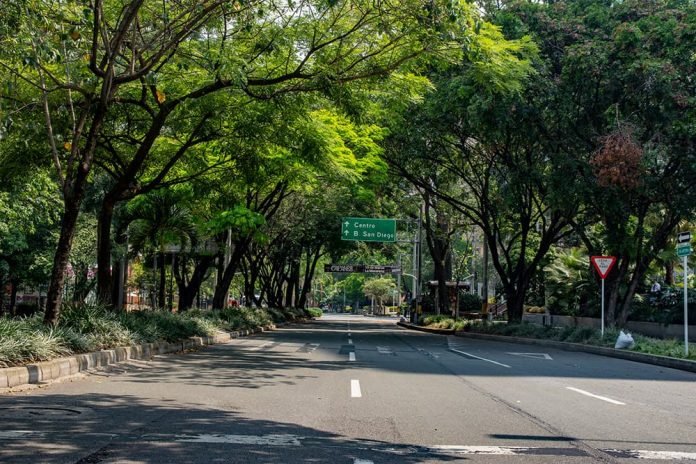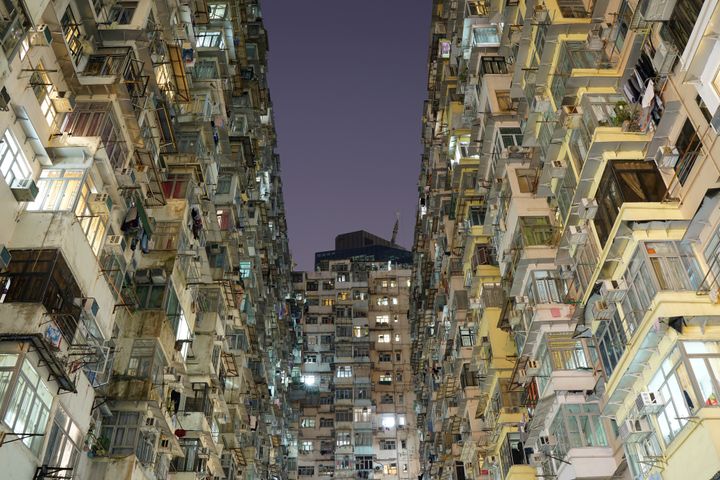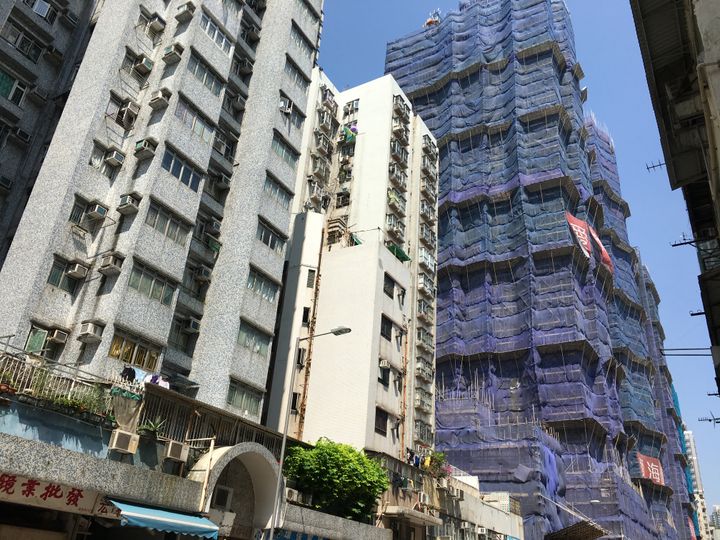Voices: Life as an expat in Colombia’s Medellín during the coronavirus pandemic

A few minutes every morning is all you need.
Stay up to date on the world's Headlines and Human Stories. It's fun, it's factual, it's fluff-free.
This Friday night was very different from the previous ones I had spent in Colombia. While I usually had plans to meet with friends, this Friday night I stayed in my apartment as I watched soldiers and police roam the streets. I was stunned as I watched pickups, trucks and even tanks drive by. I could see a police helicopter in the night sky hovering over the city, using its searchlights and megaphone to find people and summon them inside.
“What am I doing here?” I asked myself while the noise slowly faded away. After graduating with my MBA, it had been my dream to live in Medellín and start my professional career. I couldn’t have been happier when I finally got here, but at that moment, I wondered if it would have been better to have stayed home in the Netherlands.
A “19-day” lockdown
It was Friday night, March 20. This was the first day of quarantine in Medellín, which started several days before the nationwide lockdown did. Previously, I wasn’t really sure what to expect from the lockdown, but I was impressed when I saw the number of police on the streets. I heard of many people in the expat community who had returned to their home countries. This, in combination with videos of empty supermarkets in other countries, caused a sort of panic.
I had just signed the contract for my new job as a Global Analyst for a Colombian software firm. This job was way better than I had hoped for and they’d get me a Colombian visa that would allow me to stay indefinitely in the country. Plus, the lockdown would only be for nineteen days. “That shouldn’t be too bad,” I thought to myself.
The next morning, I called my parents to tell them what I had seen the night before. They were in awe as I described what a lockdown means in Colombia, which is very different from the “lockdown” they were used to in the Netherlands. In the Netherlands, gatherings of more than six people were prohibited and people were encouraged to practice social distancing. Places like restaurants, bars and gyms were closed. This was a stark difference in what lockdown in Colombia looked like.
In Medellín I was only allowed to go out once a week for grocery shopping, visits to the pharmacy and the bank. Any other activity outside the house was forbidden, unless you had a special permit.
The lockdown is extended
I expected (and hoped) that Colombia’s strict measures would prevent COVID-19 from growing out of hand in the country and I looked forward to getting back to the new reality after the lockdown.
It didn’t take long before I realized how naïve I was to think this, as president Iván Duque started extending the lockdown before the initial one had even ended. Although the infections hadn’t spiked yet, many people started wondering when the situation would end.
During the first weeks of lockdown, police would have weekly parades through the streets of the barrio that I lived in. A first this felt a little hostile as they warned us about the risks of COVID-19 and ordered us to stay inside. Maria, a lady from the corner store I befriended, even told me that police officers had screamed at her to close her shop even though she had the right permits to stay open.
However, as time went on, the tone-of-voice changed. Police started thanking us for staying inside and helping prevent the virus from spreading.
Now? They’ve diversified their tactics. Mariachi bands play their music and on special occasions, Disney figures drive by to entertain the kids from a distance. During Easter weekend, a pastor even drove by to say his prayers, because churches were still closed.
Businesses suffer

Despite the weekly entertainment I had outside my window, the effects of the pandemic started to grow more obvious on Colombia’s economy. While Colombia has one of the most stable economies in Latin America, COVID-19 is a tough pill to swallow for any country.
Soon, articles about local businesses filing for bankruptcy began appearing all over my news feed and this really hit when seventy businesses in Medellín’s prime nightlife and restaurant sector filed for bankruptcy on the same day.
The company I had signed up with had to cut costs as well. I was supposed to start my new job in the first week of April, but I got asked to sign an amendment that would suspend my contract for two months. Other than applying for my visa, there was nothing I could do to prepare for the job.
Strangely enough, I got used to it. I started doing more home-workouts, facetimed my friends and family more often, learned new recipes and watched TED Talks to pass the time.
A few weeks later, an email arrived from the head of HR, inviting me for a call with her and the CEO. “We need to discuss something,” it read. While this usually doesn’t mean good news, I wasn’t very concerned. The company had just provided my work visa and there were no rumors of layoffs yet.
But, before I knew it, I was laid off. It was understandable, as I was responsible for researching the company’s options for international expansion. Mid-pandemic, “expanding” must have been the least of their concerns.
I could tell the CEO had a hard time bringing the news to me, but he handled it very well. Unfortunately, this didn’t soften the blow for me. Here I was, unemployed, COVID-19 didn’t look like it was going to end anytime soon and unemployment rates were about to rise to almost 20% in the country.
Job hunting during COVID-19
The most logical option I saw was to book a humanitarian flight to go home to the Netherlands. I was disappointed, I missed my family and friends and I didn’t see the pandemic going away any time soon.
On the other hand, I wanted to stay positive and make sure I made the most out of my situation. Going back to the Netherlands would mean that I’d probably not move abroad for a long time, if ever. Besides, humanitarian flights were very scarce so it wasn’t even possible to get home for several weeks.
Meanwhile, the virus was still spreading slowly across Colombia. As of June, Colombia had about 30,000 confirmed cases. Considering Colombia’s population of 50 million, the number of confirmed cases proportionally was relatively controlled.
Government officials recognized that and allowed us to go outside a little more. Plans were being made to reopen restaurants and the president announced three “Días sin IVA” in June and July. These “Días sin IVA” are days where consumers don’t have to pay VAT for certain products, which is intended to encourage shopping and support of local businesses.
It worked. Consumers waited in the middle of the night at their favorite stores to be the first ones to enter. Enormous lines were formed and little to no social distancing was kept. It reminded me of videos I had seen of Black Friday.
This day seemed to spark a surge in new cases across the country. The second and third Día sin IVA were moved online to prevent new outbreaks and the lockdown got tightened up again.
In the months that followed, Colombia would surpass half a million confirmed cases.
Better times ahead
I decided to scour all job portals that I knew of and do everything in my power to stay and get a job.
Fortunately for me, after an existential crisis and many ignored job applications, I managed to. By the end of June, I got offered a job by TEAM International, an American IT Consultancy with a subsidiary in Medellín. The joy of receiving this news was indescribable as unemployment rates were then at an all-time high and I wasn’t sure if my dreams of staying in Colombia were still realistic.
Once I got the job offer, everything started to move very quickly. In a matter of weeks, I had arranged a new visa and I could start onboarding. I’ve spent two months at my new job and enjoyed every second of it.
What’s even more important is that the situation around COVID-19 in Colombia is improving as well. The cases of COVID-19 are diminishing, mortality rates in Medellín are low and there hasn’t been a shortage of intensive care units in Medellín.
This was reason enough for the mayors of all ten municipalities in the Medellín Metropolitan Area to announce a campaign to reopen the economy, called “Todo Va A Estar Bien.” This translates to “Everything Will Be Alright” in English.
Starting September, Medellín will allow people to go outside again without restrictions, for the first time since March 20. Restaurants and gymnasiums will reopen again and plans are being made to reopen many more industries in the coming months.
The pandemic is still far from over, but the signs are promising. It has been tough at times, but spending the pandemic in Medellín has taught me valuable lessons that I otherwise would not have learned. I’m much more appreciative of the things that seemed normal before. I am also thankful for the support of my friends and family and the opportunities that Colombia provided me despite the pandemic. I’m happy to see the situation improving again and I hope the country will get back on track soon.
I look forward to seeing what the future has in store and I’m excited to spend more time in this beautiful country.
This Voices story was written by Niels Schipper. Niels moved to Medellín, Colombia in February 2020 and currently works at TEAM International.
Have a story to share? Get in touch at contributors@themilsource.com




Comments ()